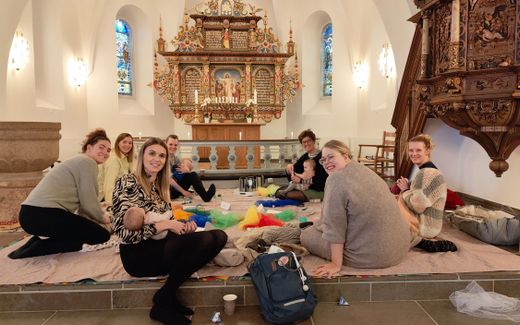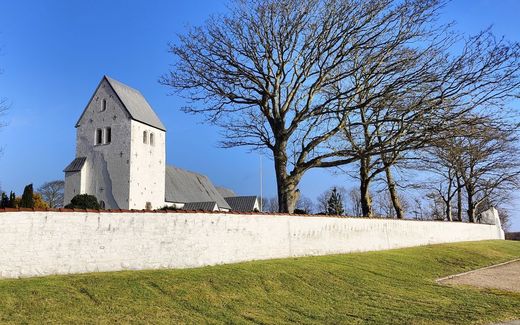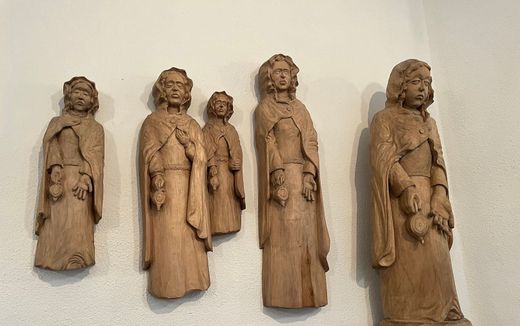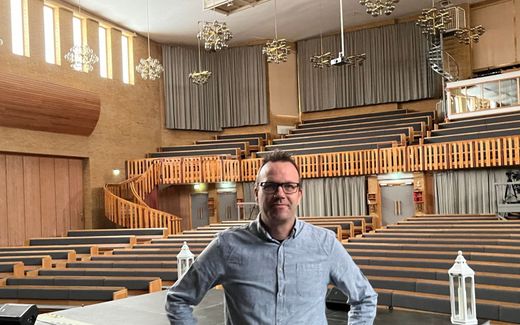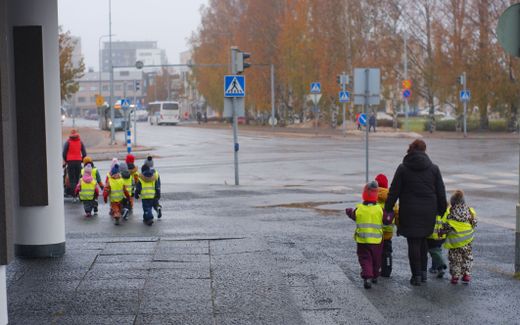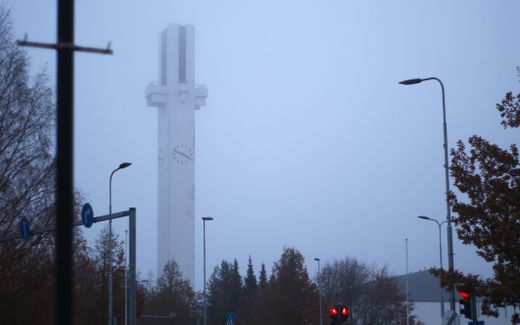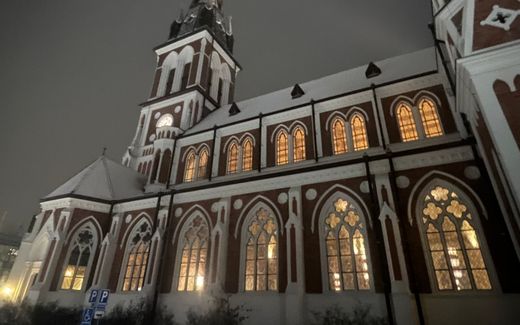Biblebelt feature: Hats and hymnes in the Irish Biblebelt (1/2)
30-04-2024
Western Europe
Kees van den Brink, RD
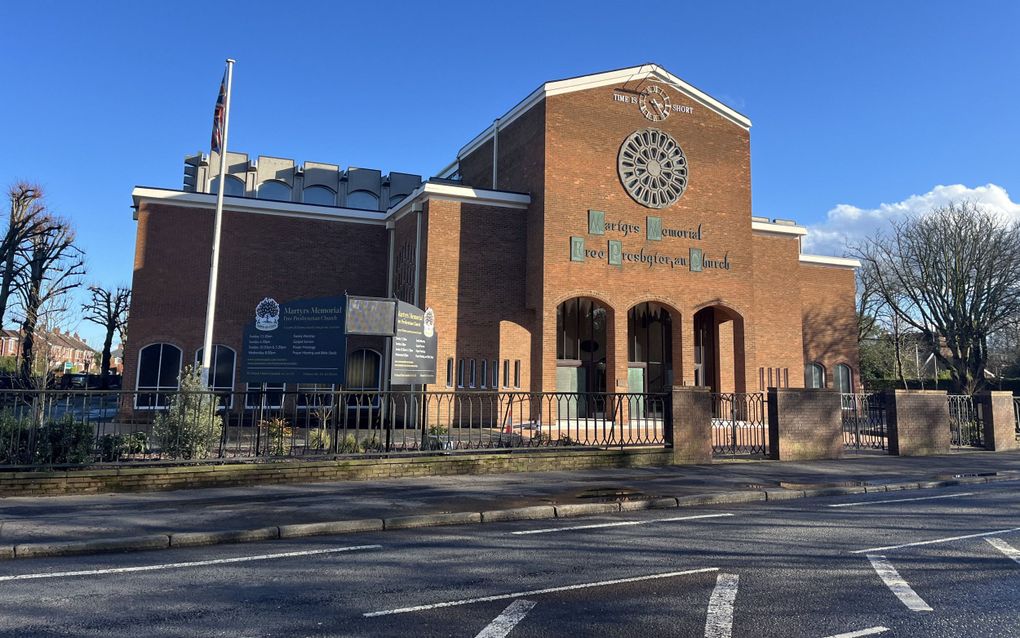
The church building of the Martyrs Memorial Church in Belfast where the famous Rev. Ian R.K. Paisley preached. Photo RD
Western Europe
"Jesus Christ is returning soon. Are you ready?" a banner reads at the entrance to Ballymena, a village in the heart of Northern Ireland's Biblebelt. Christianity is never far away here.
In soft tints, hymn melodies chime from the organ as visitors trickle into the church hall this Tuesday evening in February. Simple headgear adorns the ladies, all dressed in skirts or dresses. The weekly prayer meeting of the Free Presbyterian Church of Ulster (FPCU; Ulster is more or less synonymous with Northern Ireland) in Ballymena is about to start. It usually takes place in the church's annex, but there is a "Youth Challenge Week" going on there just this week, aimed at young people from its own congregation.
Part 5 of a series of European Biblebelts. Earlier editions were about Finland, Sweden, Germany, and Denmark
They are, therefore, missing from the prayer meeting, but they are prayed for there. This is done by several male members, who take turns to pray. People also pray for the sick in the congregation, for the annual mission week for secular people, and for obtaining assurance of faith.
Because that's what the sermon, which precedes the moment of prayer, is about. Rev. Andrew Stewart (43), pastor of the congregation with some 500 members since 2020, highlights the theme in about 40 minutes –fast speaking with Northern Irish accent– from the Westminster Confession.
Assurance of faith must rest above all on the infallible Word of God, says pastor Stewart. "Only Christ saves us; only the Word assures us," he said. Standing, the congregation sings a hymn by Horace Bonar following the sermon: "Our life is hid with Christ,/ with Christ in God, above."
Liberal tendencies

You could call Ballymena a 'capital' of Northern Ireland's Biblebelt. Of the 30,000 inhabitants in the town, many go to church, and by no means do all attend the FPCU congregation. That denomination, with 60 congregations over 10,000 members in Northern Ireland, was formed in 1951 as a breakaway from the Presbyterian Church of Ireland (PCI). With just under 200,000 members, the PCI is the largest denomination in Northern Ireland – a churchy country anyway: half consider themselves "practising Christians" according to a recent survey – and has six different church buildings in Ballymena alone.

The PCI is quite conservative. Liberal theological tendencies, which, among other things, caused the FPCU to secede in the last century, are decreasing rather than increasing. As recently as June 2022, the PCI’s outgoing assembly moderator said that the denomination "will not rewrite the Bible" when it comes to abortion, euthanasia, gay marriage and transgenderism.
Separatist
However, the statement that the PCI is conservative is not something an FPCU pastor is likely to make. The FPCU describes itself on its website as not only "Reformed in doctrine" but also "separatist in practice".
Stewart: "We don't work with the PCI. Its moderator met with the Pope just a few years ago. But there are saved people there too, you know, we are not the only Christians."
Noticeable differences between the FPCU and the PCI, by the way, are certainly there. In the PCI, you may find women pastors or a music band on the podium of the sanctuary. Those things are out of the question for FPCU congregations.
And the Bible translation –the King James Version– is not tampered with by the FPCU under any circumstances.
Ian Paisley
The isolated nature of the FPCU is partly the legacy of founder Rev. Dr. Ian R.K. Paisley (1926-2014), a renowned pulpit speaker, politician and even first minister of Northern Ireland in the years 2007 and 2008. The latter, by the way, ensured that the preacher is not only remembered positively in his own denomination.
It was later agreed that it was "wiser" for an FPCU pastor not also to be a politician, according to Rev. Stewart. Paisley's memory is still most visible in the capital city of Belfast, where he opened his own church in 1969: the Martyrs Memorial Church, which is now partly home to the FPCU's theological training.

The FPCU is further known for its open air preachings, says Mr. Stewart. He also holds these every week in the centre of Ballymena. "There is an increasing resistance to it. Someone once tried to knock a tooth out of me," says the preacher. "We are very focused on evangelism. When I was inducted as a pastor, I had to swear an oath to adhere to the free offer of the Gospel. Last year, as a congregation, we held our annual mission week. Many extra-church people came then. At least one man came under real conviction of sins."
Another unique feature of the FPCU is that members may choose between faith baptism or infant baptism. Most preachers follow the first variant; parents who want their baby baptised can have one of the preachers who agrees with this come for a week-day service in private for this purpose. But despite this difference, there is no debate in the FPCU on the importance of education for the youth. Children who recite all 107 questions of the Short Catechism of Westminster receive a prize.
Confession
With the FPCU and the PCI, the churches in Ballymena are far from being listed. There are some "Gospel Halls" of the "Brethren" (similar to the Assembly of Believers), two Baptist churches and a Covenant Protestant Reformed Church, with the Dutch Three Forms of Unity as its confession. In the nearby area of Ballymena, the Reformed Presbyterian Church of Ireland (some 1800 members total, singing only psalms in church) has a church building.

The nearest congregation of the small Evangelical Presbyterian Church of Northern Ireland (ten congregations and less than a thousand members) is in Ballyclare, a 20-minute drive from Ballymena. Almost all these churches stress that they see the Bible as the infallible Word of God. Often, the Reformed confessional writings of Westminster are the starting point, and women wear head coverings during worship.
Ballymena also has a Methodist Church, a Pentecostal Church, the charismatic megachurch Green Pastures Church, the old St Patrick's Church of the Anglican Church of Ireland and the Roman Catholic All Saints Church. So, there is plenty of choice, with the many Protestant churches in particular defining the image of the Biblebelt village Ballymena. Yet Rev. Stewart is not necessarily optimistic. "There is a lot of drug use and crime. In fact, the village is quite secular. But there is a biblical work ethic here."
Old school building
That County Antrim in "Ulster" is so Christian can be partly explained by the 1859 revival. "Thousands of people were converted then," says Rev. Stewart. To accurately tell that story for a newspaper, he brought in Rev. David Linden (72), pastor emeritus of FPCU. The latter wrote a pamphlet about "1859" and knows the historical places unerringly. Kells, for example, where the revival started with four young men holding weekly prayer meetings in an old school, which is now a residential house. The resident does not know the rich history of his house, it turns out when Stewart rings the doorbell. En passant, he invites the man to his church's upcoming mission week.
Another historical location that Mr. Linden navigates to is a former church building –now a doctor's surgery– in the village of Ahoghill. On a Monday evening in March 1859, there were 3,000 people in the church building, which had 1,200 seats, says Linden. "When the gallery threatened to collapse, the preacher admonished the visitors to leave. They did, in the pouring rain, but they did not go home. People were praying in the mud under heavy conviction." A beam of the former gallery is still visibly bent.
"1859" was not the only revival in Northern Ireland. The early twentieth century saw a revival under the preaching of Rev. W.P. Nicholson (1876-1959). An extra shed had to be built in the Belfast shipyard to store the stolen tools that converted workers came to return, says Mr. Stewart. "We long for God to work again in a special way. We believe in revival."
This article was translated by CNE.news and published by the Dutch daily Reformatorisch Dagblad on April 18, 2024
Related Articles


